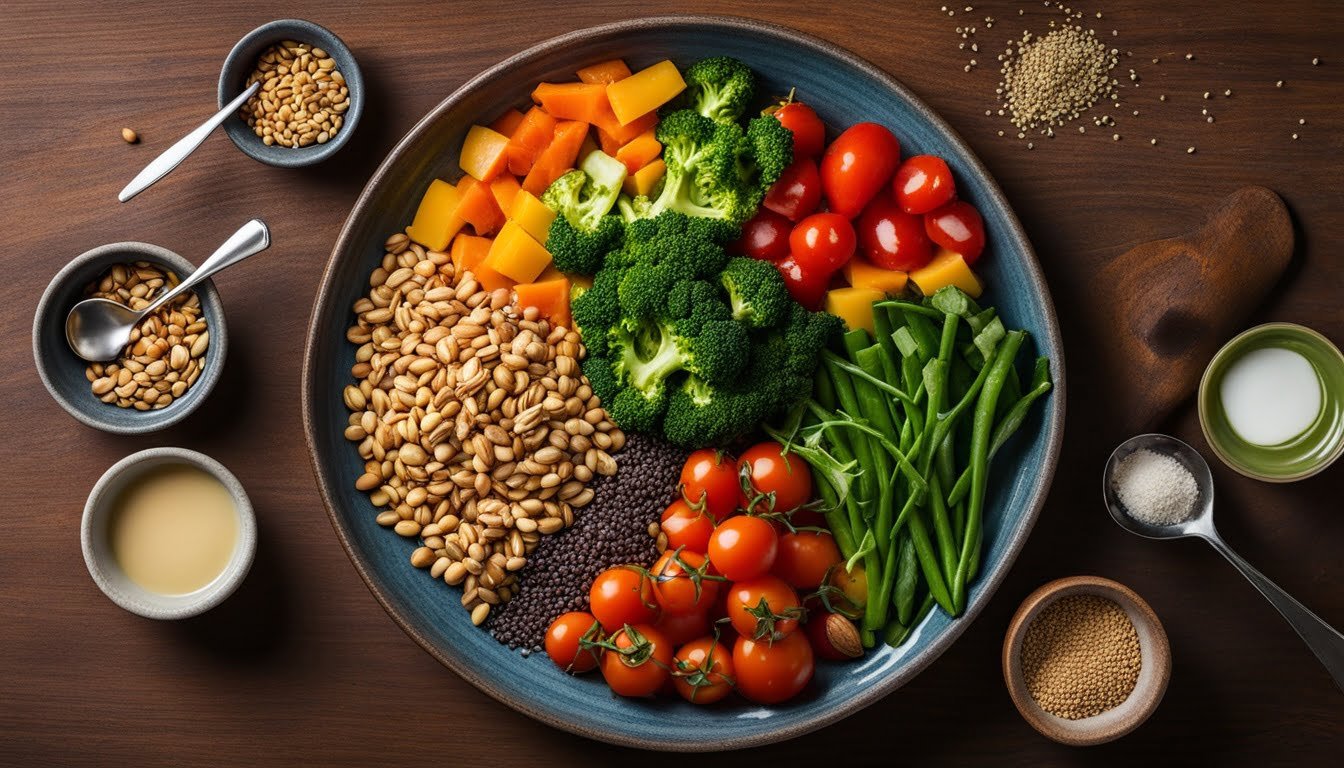Polycystic ovary syndrome, or PCOS, affects many women in the U.S. About 5 million in total, reports the CDC. It’s a lifelong condition that upsets hormone levels. This leads to insulin resistance and too many male hormones. These issues make ovulation, periods, and getting pregnant hard. They also cause acne, and extra hair on the face and body. But, a good PCOS meal plan can help with insulin resistance and weight loss. It focuses on eating anti-inflammatory, low glycemic foods.
Key Takeaways
- PCOS affects up to 12% of women of reproductive age in the U.S.
- PCOS is linked to insulin resistance and hormonal imbalances
- A balanced PCOS meal plan can help manage insulin resistance and promote weight loss
- Anti-inflammatory and low glycemic foods are key for a PCOS-friendly diet
- Incorporating healthy fats, lean proteins, and fiber-rich carbs are essential
Understanding PCOS and Its Impact
PCOS is a disorder that changes how your body works. It can change how you look, affect if you can have babies, and your health in the future. Women with PCOS might have more hair on their face or body, be overweight, or lose hair like men. They might also miss their periods, get acne, or have small flaps of skin. When a woman has PCOS, it’s hard for her to have a baby. She might also get little cysts in her ovaries, but these are not always there with the PCOS diagnosis.
Prevalence and Symptoms of PCOS
According to the Centers for Disease Control and Prevention, PCOS affects many women in the U.S. It’s seen in 6% to 12% of women who could have babies, or maybe as many as 5 million in the U.S. These women have special symptoms that can make their lives hard and affect their health a lot.
Hormonal Imbalances and Insulin Resistance
In PCOS, the body might be overweight or have high blood sugar. This can make the body swollen and cause other problems. It becomes hard to stop the cycle of being overweight, having hormonal problems, and dealing with insulin not working right. Many women with PCOS, anywhere from 35% to 80%, find that their insulin does not help their blood sugar go into the cells right. This might cause diabetes over time.
Diagnosing PCOS: Tests and Evaluations
For a PCOS diagnosis, the doctor will check if you have some common signs. These may include not releasing eggs, having high androgens, and ovary growths. They must also check for other similar health issues to be sure. Tests and evaluations are crucial in identifying PCOS accurately and planning how to handle it.
The Importance of Diet in Managing PCOS
A good pcos diet can’t cure PCOS. But it can really help. By eating well, you can make the symptoms less and feel better. Try eating three meals and a snack, spreading them four to six hours apart. This helps keep your insulin levels steady.
Dietary Strategies for Blood Sugar Regulation
For PCOS, it’s key to mix carbs and sugars with protein and fiber. This pairing slows down sugar going into your blood. A helpful diet plan is to eat smaller, healthy meals along with some bigger ones before you get active. This approach supports your energy and lowers PCOS issues over time.
Anti-Inflammatory Foods and Their Benefits
Since PCOS can cause swelling, it’s smart to eat foods that fight it. Losing weight might help too. So, focus on pcos anti-inflammatory foods like whole grains, lean meats, foods high in fiber, and good fats. Include foods like fish, berries, and spices that beat inflammation.
An pcos anti-inflammatory diet with plenty of protein, good fats, and fiber is great for PCOS. Eating snacks between meals is also a good idea. It stops you from eating too much and keeps your blood sugar stable.
pcos meal plan weight loss
Start with a pcos meal plan weight loss that helps balance blood sugar and fights inflammation. Aim for 25 to 30 grams of protein at each meal and 8 to 10 grams for snacks. To get enough fiber (about 30 grams a day), eat lots of fruits, veggies, legumes, and whole grains. Try to pick whole-grain carbs over sugary and processed ones.
Nutrient-Dense Foods for PCOS
Use the MyPlate guide by filling half your plate with non-starchy fruits and veggies. Add lean protein for another quarter and starchy carbs and grains for the last quarter. To get more antioxidants, eat plenty of colorful fruits and veggies. Also, have fatty fish (like salmon) twice a week and use healthy fats from oils.
Portion Control and Balanced Meals
Eating balanced pcos balanced meals is key to feeling better. It’s all about the right portions of pcos nutrient dense foods such as protein, fiber, and good fats. This mix helps your body handle sugar and fights inflammation.
Best Foods for PCOS
Eating right can help with PCOS symptoms. Include whole grains and high-fiber foods, lean proteins, plant-based options, healthy fats, antioxidant fruits, and spices. This mix can balance blood sugar, fight inflammation, and boost health.
Whole Grains and High-Fiber Foods
Whole grains are great for PCOS folks. They are full of fiber, making you feel full. This can help with blood sugar. Oats, quinoa, and brown rice have ferulic and caffeic acids which fight inflammation.
Lean Proteins and Plant-Based Alternatives
Adding lean proteins is key for PCOS care. Think poultry, fish, pork, beans, lentils, and soy. These foods keep you full and help control blood sugar.
Healthy Fats: Olive Oil, Avocado, and Fatty Fish
Don’t avoid healthy fats with PCOS. Foods rich in omega-3s, like salmon, and olive oil, avocado can cut inflammation. They can also make insulin work better.
Berries and Other Antioxidant-Rich Fruits
Berries are perfect for PCOS. Elderberries, blackberries, and more have lots of antioxidants. They fight inflammation linked to PCOS.
Anti-Inflammatory Spices and Herbs
Using anti-inflammatory spices and herbs in cooking is good for PCOS. Try sage, rosemary, turmeric, and more. They reduce inflammation and are good for you.
Foods to Avoid or Limit
Managing PCOS means watching what you eat. It’s best to avoid sugary drinks and too many refined carbohydrates. These can make your symptoms worse. They also raise your blood sugar and harm how your body uses insulin.
Sugary Drinks and Refined Carbohydrates
Sugar and PCOS don’t mix well. It makes your body respond badly. This can make your PCOS symptoms and diabetes risk worse. Drinks with lots of sugar raise your blood sugar a lot.
Stay away from drinks like these. Also, limit foods made from refined carbohydrates. This means things like white bread, pasta, and cakes. They can also quickly raise your blood sugar.
Processed and Fried Foods
Processed foods often have bad fats and low fiber. They also have too much sugar. These are bad news for your health. They include things like processed meat, chips, and ready-made cakes.
These foods also have lots of preservatives. More studies show these preservatives aren’t good for you. Fried foods are another no-no. They have unhealthy fats that can make your PCOS worse. They also have lots of calories.
Alcohol and Its Impact on PCOS
Alcohol is risky for women with PCOS. It can mess with brain chemicals. This can lead to depression, anxiety, and bad mood swings.
Drinking enough to get a hangover is also tough on your body. It stresses you out physically. So, it’s best for women with PCOS to avoid alcohol.
Sample PCOS Meal Plan
An example PCOS sample meal plan could include:
Breakfast: Overnight oats with steel-cut oats, almond milk, chia seeds, and blueberries
Mid-Morning Snack: Mixed nuts and seeds
Lunch: Quinoa salad with grilled chicken, bell peppers, cucumbers, and tomatoes
Afternoon Snack: Spinach, berry, and flax seed smoothie
This balanced PCOS meal plan focuses on wholegrains, good protein, healthy fats, and enough fiber. It helps handle PCOS symptoms well. Everyone’s food needs may be different. But, this plan is full of nutrients and good for managing PCOS.
Tips for a Healthy PCOS Lifestyle
Living with PCOS means following a healthy lifestyle. This includes being active every day. Regular pcos exercise and pcos physical activity are key.
Regular Exercise and Physical Activity
Doing exercises helps your body. It can lower swelling, help you lose weight, and make insulin work better. It’s good to mix up exercises like walking, lifting weights, and stretching. The CDC says aim for 30 minutes of medium-paced workouts, 5 days a week, if you have PCOS.
Stress Management Techniques
Worrying a lot can make PCOS worse. It causes swelling and upsets your hormones. Try relaxing activities like meditation, yoga, or deep breaths. Doing things you love helps, too. Make sure to get enough sleep each night. Adults should try for at least 7 hours, says the CDC.
Support Systems and Resources
Having others to talk to and learning more about PCOS can be a big help. Connect with other women facing PCOS. Join online groups. Good healthcare is important, too. Work with your doctors and dietitian. Together, they can guide and support you in dealing with PCOS.
Working with a Registered Dietitian
Are you looking for ways to manage pcos? Working with a pcos registered dietitian can be a big help. They create personalized pcos customized meal plans for you. These plans focus on your symptoms and goals. A dietitian can make a special eating plan for you. It will help with blood sugar, weight, and health.
Monitoring Progress and Adjusting Strategies
Keeping track of your progress is important. You and your dietitian should see what’s working or not. Then, you can adjust your pcos strategy adjustments and lifestyle plans. This teamwork helps manage your PCOS well.
PCOS and Fertility Considerations
PCOS is a top issue for not being able to get pregnant. It affects 70-80% of women with this sickness. Eating right by watching your blood sugar, cutting down on body reactions, and helping your hormones can make it easier to have a baby for women who have pcos fertility.
Dietary Approaches for Enhancing Fertility
For women with PCOS, a diet that helps with pcos fertility includes lots of plant-based proteins, fiber, and important nutrients found in foods like beans and lentils. It’s also good to eat seafood that has a lot of omega-3 fats, lean meats, and olive oil to lower body reactions and boost chances of getting pregnant. Don’t forget to eat a variety of colorful veggies, fresh fruits, and whole grains. These give you things like vitamins and minerals that help keep you healthy and keep your hormones in check.
Preconception Nutrition and Lifestyle Changes
If you have PCOS and want to have a baby, changing what you eat and how you live ahead of time can make a big difference. This means getting to a good weight, controlling your blood sugar, and cutting back on body reactions. It also means making sure you get enough nutrients like folic acid, vitamin D, and omega-3s. People who know a lot about this suggest drinking lots of water, eating balanced meals, keeping an eye on how much salt you eat, eating slowly, preparing your meals in advance, maybe taking certain vitamins, making sure you sleep enough, moving on a regular basis, and finding ways to deal with being stressed.
Success Stories and Inspiration
Reading about other women’s success stories is inspiring. They have managed their PCOS through diet and lifestyle changes. These stories show how a PCOS-friendly meal plan and healthy habits can help.
Real-Life Experiences with PCOS Meal Planning
Megan Birke lost over 100 pounds while fighting PCOS and hypothyroidism. After gaining weight in her first pregnancy, she hit 260 pounds. She tried many diets but often stopped after losing a little weight. In March 2019, she started a new journey. She lost 20 pounds in the first month, and all without surgery.
For her daily meals, Megan has two eggs and apple chicken sausage for breakfast. She adds mustard for taste. For snacks, she enjoys apple with nut butter, yogurt, and avocado. Lunch is a tuna bowl. Dinner includes salmon, asparagus, and a spinach salad. She also enjoys healthier dessert options.
Overcoming Challenges and Maintaining Motivation
PCOS can be hard to manage. It brings tough symptoms, needed diet changes, and a big push to stay motivated. But learning to beat these challenges is key. It helps women with PCOS reach their health goals and keep up the good changes they’ve made.
In Megan’s journey, she made some important changes. She stopped eating junk food, started moving every day, and didn’t make excuses. This recipe for success helped her lose 110 pounds. The first 100 pounds were gone in just six months.
Conclusion
A balanced meal plan with the right foods helps a lot for PCOS. It can improve how you use insulin, help you lose weight, and make you healthier. Working with a dietitian and living healthy can change your PCOS life for the better.
Research shows that changing your diet and how you live can really help with PCOS. It can keep your blood sugar in check, lower inflammation, help you get pregnant, and prevent serious health problems. A good plan can make a big difference for women with PCOS.
Eating meals that are good for PCOS, doing regular exercise, and managing stress are key. Taking steps that fit you can help stop the effects of PCOS. You can get better and enjoy life more, step by step. Remember, you can control your PCOS and live well.



